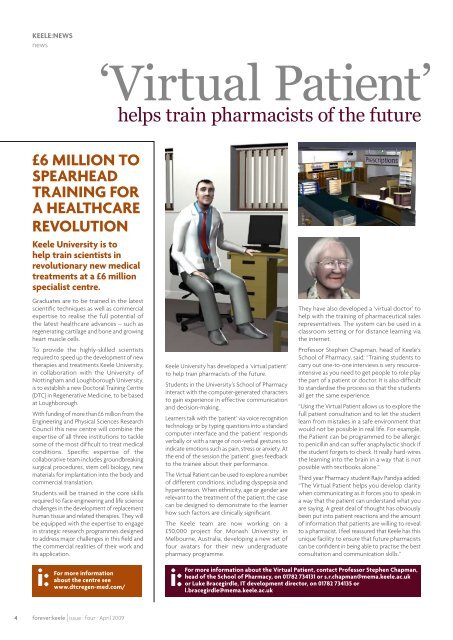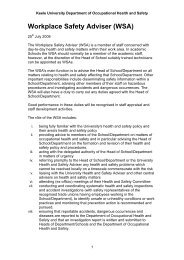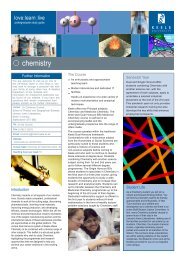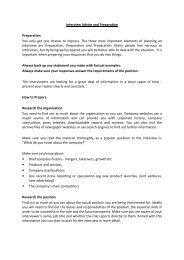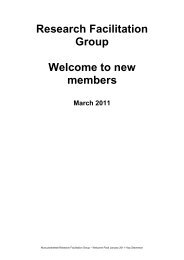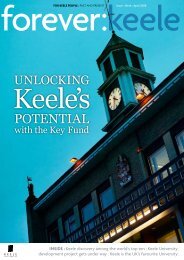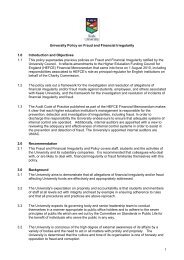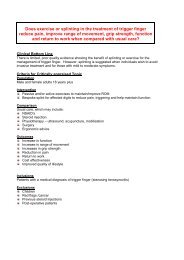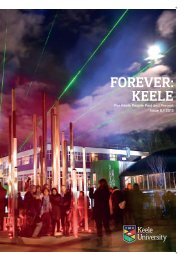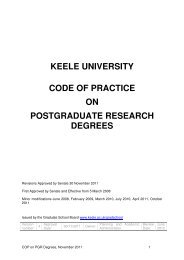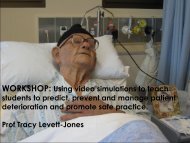Download (2.76 MB) - Keele University
Download (2.76 MB) - Keele University
Download (2.76 MB) - Keele University
Create successful ePaper yourself
Turn your PDF publications into a flip-book with our unique Google optimized e-Paper software.
keele:NEWS<br />
news<br />
‘Virtual Patient’<br />
helps train pharmacists of the future<br />
£6 million to<br />
spearhead<br />
training for<br />
a healthcare<br />
revolution<br />
<strong>Keele</strong> <strong>University</strong> is to<br />
help train scientists in<br />
revolutionary new medical<br />
treatments at a £6 million<br />
specialist centre.<br />
Graduates are to be trained in the latest<br />
scientific techniques as well as commercial<br />
expertise to realise the full potential of<br />
the latest healthcare advances – such as<br />
regenerating cartilage and bone and growing<br />
heart muscle cells.<br />
To provide the highly-skilled scientists<br />
required to speed up the development of new<br />
therapies and treatments <strong>Keele</strong> <strong>University</strong>,<br />
in collaboration with the <strong>University</strong> of<br />
Nottingham and Loughborough <strong>University</strong>,<br />
is to establish a new Doctoral Training Centre<br />
(DTC) in Regenerative Medicine, to be based<br />
at Loughborough.<br />
With funding of more than £6 million from the<br />
Engineering and Physical Sciences Research<br />
Council this new centre will combine the<br />
expertise of all three institutions to tackle<br />
some of the most difficult to treat medical<br />
conditions. Specific expertise of the<br />
collaborative team includes groundbreaking<br />
surgical procedures, stem cell biology, new<br />
materials for implantation into the body and<br />
commercial translation.<br />
Students will be trained in the core skills<br />
required to face engineering and life science<br />
challenges in the development of replacement<br />
human tissue and related therapies. They will<br />
be equipped with the expertise to engage<br />
in strategic research programmes designed<br />
to address major challenges in this field and<br />
the commercial realities of their work and<br />
its application.<br />
i:<br />
For more information<br />
about the centre see<br />
www.dtcregen-med.com/<br />
<strong>Keele</strong> <strong>University</strong> has developed a ‘virtual patient’<br />
to help train pharmacists of the future.<br />
Students in the <strong>University</strong>’s School of Pharmacy<br />
interact with the computer-generated characters<br />
to gain experience in effective communication<br />
and decision-making.<br />
Learners talk with the ‘patient’ via voice recognition<br />
technology or by typing questions into a standard<br />
computer interface and the ‘patient’ responds<br />
verbally or with a range of non-verbal gestures to<br />
indicate emotions such as pain, stress or anxiety. At<br />
the end of the session the ‘patient’ gives feedback<br />
to the trainee about their performance.<br />
The Virtual Patient can be used to explore a number<br />
of different conditions, including dyspepsia and<br />
hypertension. When ethnicity, age or gender are<br />
relevant to the treatment of the patient, the case<br />
can be designed to demonstrate to the learner<br />
how such factors are clinically significant.<br />
The <strong>Keele</strong> team are now working on a<br />
£50,000 project for Monash <strong>University</strong> in<br />
Melbourne, Australia, developing a new set of<br />
four avatars for their new undergraduate<br />
pharmacy programme.<br />
i:<br />
l.bracegirdle@mema.keele.ac.uk<br />
They have also developed a ‘virtual doctor’ to<br />
help with the training of pharmaceutical sales<br />
representatives. The system can be used in a<br />
classroom setting or for distance learning via<br />
the internet.<br />
Professor Stephen Chapman, head of <strong>Keele</strong>’s<br />
School of Pharmacy, said: “Training students to<br />
carry out one-to-one interviews is very resourceintensive<br />
as you need to get people to role play<br />
the part of a patient or doctor. It is also difficult<br />
to standardise the process so that the students<br />
all get the same experience.<br />
“Using the Virtual Patient allows us to explore the<br />
full patient consultation and to let the student<br />
learn from mistakes in a safe environment that<br />
would not be possible in real life. For example,<br />
the Patient can be programmed to be allergic<br />
to penicillin and can suffer anaphylactic shock if<br />
the student forgets to check. It really hard-wires<br />
the learning into the brain in a way that is not<br />
possible with textbooks alone.”<br />
Third year Pharmacy student Rajiv Pandya added:<br />
“The Virtual Patient helps you develop clarity<br />
when communicating as it forces you to speak in<br />
a way that the patient can understand what you<br />
are saying. A great deal of thought has obviously<br />
been put into patient reactions and the amount<br />
of information that patients are willing to reveal<br />
to a pharmacist. I feel reassured that <strong>Keele</strong> has this<br />
unique facility to ensure that future pharmacists<br />
can be confident in being able to practise the best<br />
consultation and communication skills.”<br />
For more information about the Virtual Patient, contact Professor Stephen Chapman,<br />
head of the School of Pharmacy, on 01782 734131 or s.r.chapman@mema.keele.ac.uk<br />
or Luke Bracegirdle, IT development director, on 01782 734135 or<br />
4<br />
forever:keele | issue : four : April 2009


